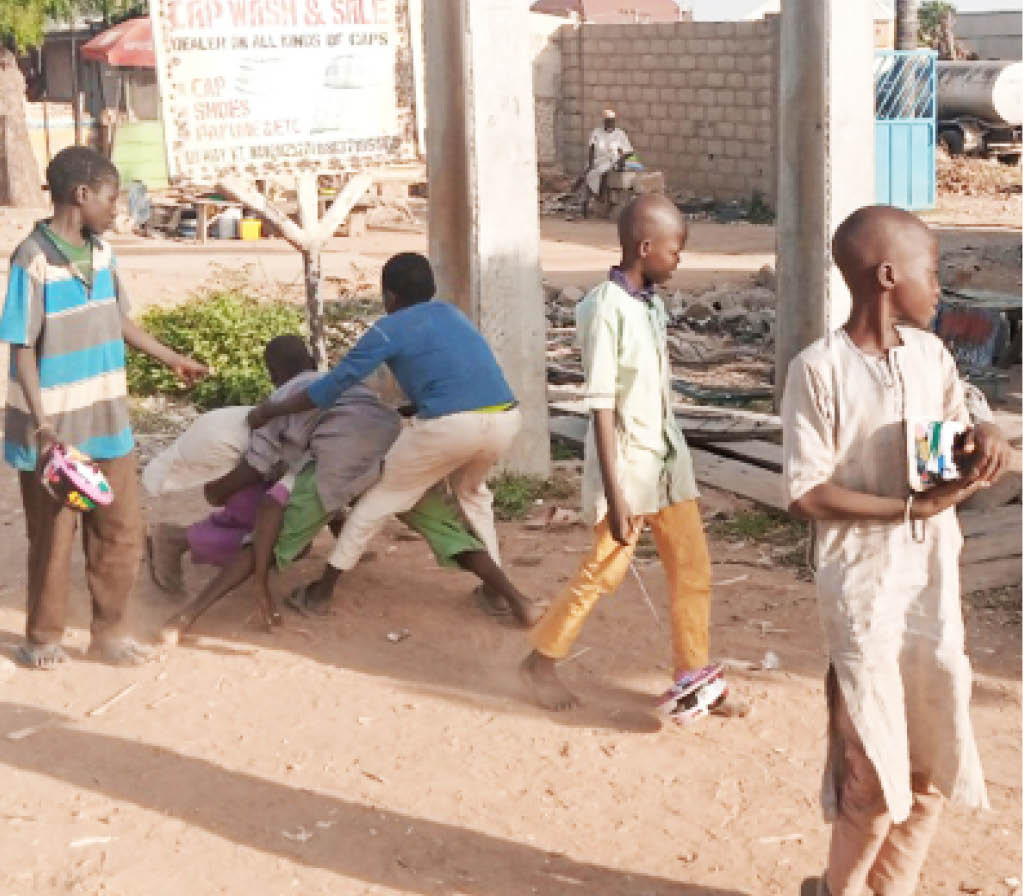Still on Almajirai repatriation
In its response to the second wave of the COVID-19 pandemic in parts of the country, the Nasarawa State government recently repatriated 40 Almajirai to their various states of origin. The Commissioner for Women Affairs and Social Development in the state, Halima Jabiru, disclosed this last week Monday in Lafia while addressing the Almajirai before […]

Some Almajirai in Katsina PHOTO: Tijjani Ibrahim
In its response to the second wave of the COVID-19 pandemic in parts of the country, the Nasarawa State government recently repatriated 40 Almajirai to their various states of origin. The Commissioner for Women Affairs and Social Development in the state, Halima Jabiru, disclosed this last week Monday in Lafia while addressing the Almajirai before their departure to their respective states. She said, “Your repatriation back to your home states was a collective decision of all the Northern States Governors in a bid to ensuring children are saved from the streets.”
Jabiru decried the attitude of some teachers who hid some of the children during the repatriation exercise and returned them to the streets later. Such teachers, she said, were taken to court and tried in accordance with the Executive Order recently signed into law by the governor. At the height of the first wave of the coronavirus, Nasarawa State government repatriated 788 Almajirai to their various home states on Sunday May 3, 2020. The repatriation then followed instances of the Almajirai testing positive to COVID-19 in some states of the federation.
- No quit notice to Fulani in South West – Governors
- BREAKING: Igboho’s house in Ibadan gutted by fire
Before the latest evacuation of Almajirai from Nasarawa State, a joint task force of security personnel including the military and police raided the residence of Sheikh Dahiru Usman Bauchi in Kaduna at midnight on Wednesday, January 13, 2021 and evacuated over 100 Qur’anic school pupils. The action, according to Kaduna State government, was meant to forestall the spread of the coronavirus. The pupils, who it claimed violated the state’s school closure order, were first taken to the Hajj camp in Kaduna before their transportation to their respective places of origin. But if any Almajiri tested positive to the COVID-19, an isolation centre should be his destination, not his home state.
While efforts by state governors to ban street begging, which over the years became an integral part of the Qur’anic school system, especially in the northern part of the country is commendable, the manner in which they are going about it is unwelcome. The deportation of Almajirai that followed the outcome of the Tuesday, April 21, 2020 teleconference meeting by governors of the 19 Northern states which banned street begging was ill-timed. Such a measure is better carried out when the country is not under any health emergency such as the COVID-19. Their repatriation in this period subjects them and others to the risk of contracting the coronavirus.
The same mode of evacuation in the second wave of the coronavirus is yet condemnable. The inhuman treatment of the Almajirai, including transporting them in trucks or crammed in buses, is unacceptable. It was scandalous to wake up, evacuate and dump vulnerable children at a hajj camp; worst still, at the wee hours of the night. Like other children, the Almajirai are entitled, under the country’s Child Right Act, to some basic human rights, including the right to education and the right to dignity of their persons. As victims of parents’ dereliction of their duties and government’s abdication of its social responsibility, the Almajirai deserve fair treatment. The lackadaisical management of the Almajiri phenomenon in Nigeria is a shameful reflection of how government, which has solutions to the problem, has failed this vulnerable group of Nigerian children.
A recent media report indicates that the Almajirai repatriated in May 2020 have again returned to the streets. This is not unexpected because neither was a legal framework put in place to stop the practice nor concrete arrangements made to reform and provide the Almajirai with the education they are seeking. To reform the Qur’anic school system of education bedevilled with operational crises in Nigeria, former President Goodluck Jonathan built Tsangaya Model Schools in parts of the country. Regrettably, most of these schools have been converted into other uses where they have not become pens for sheep.
Coming from the region where this system of education is famous, President Muhammadu Buhari is better disposed to leading the 19 Northern governors in genuinely ending the menace associated with Tsangaya education once and for all. Government must show commitment to the Tsangaya model of education by providing necessary legal, institutional, and infrastructural framework required for its success.
